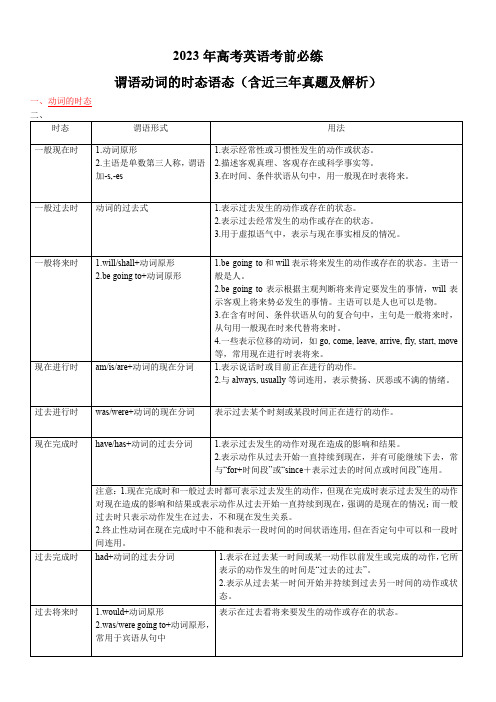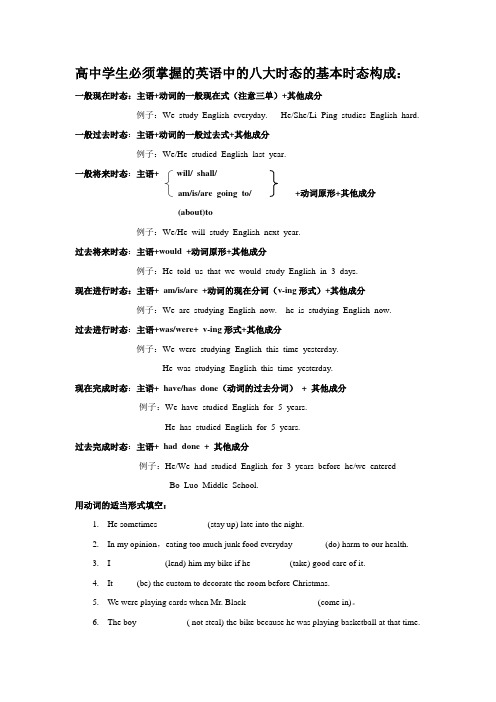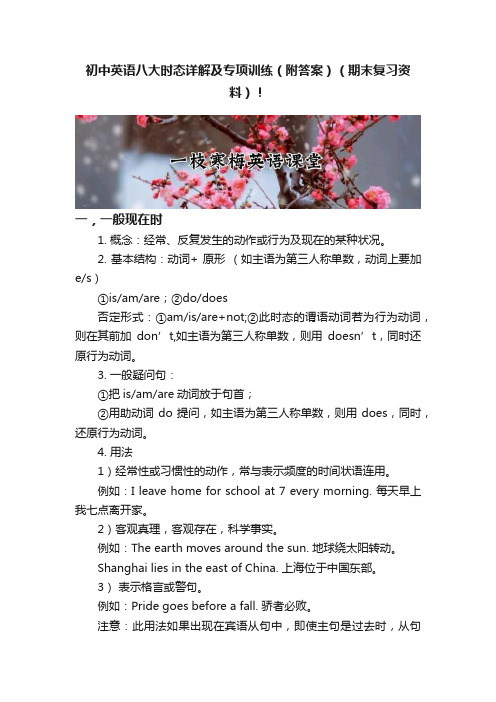过去完成时,将来进行时,被动语态,have的用法题
2023年高考英语考前必练 谓语动词的时态语态(含近三年真题及解析)

2023年高考英语考前必练谓语动词的时态语态(含近三年真题及解析)一、动词的时态特殊用法1.在时间、条件和让步状语从句中,如果主句谓语动词是一般将来时,从句用一般现在时。
如:We’ll have a picnic if it is fine next Sunday.如果下个星期日天气晴朗,我们将去野餐。
I’ll call you as soon as I get to Beijing tomorrow.我明天一到北京就给你打电话。
2.某些表示起始、往返、出发、到达之意的动词,可用一般现在时表示按规定、计划或安排将要发生的动作(此时一般都有一个表示未来时间的状语)。
这类动词有:begin, come, go, leave, start, arrive, end, stop, open, close等。
如:The meeting begins at 2:00 p.m. tomorrow.这个会议明天下午2点开始。
The next train leaves at 7 o’clock this evening.下一列火车将在今晚7点离开。
3.现在进行时与always, continually, forever等副词连用,表示反复出现或习惯性的动作,这种用法往往表达说话人的某种感情,如赞扬、遗憾、讨厌或不满等。
如:The rich woman is always laughing at the poor.这个有钱的夫人总是嘲笑穷人。
4.现在完成时中表示短暂动作的动词不能与for, since等引导的时间状语连用。
如与一段时间连用,要把瞬间动词转化为意思相近的延续性动词。
常见的变化有:特殊用法1.open,lock,write,read,sell,clean,wash,cut,drive等词作不及物动词时,它们的主语为物,可用主动语态表示被动意义。
如:This kind of pen writes very smoothly.这种钢笔写起来很流畅。
中考英语-八大时态的基本时态练习(含答案)

高中学生必须掌握的英语中的八大时态的基本时态构成:一般现在时态:主语+动词的一般现在式(注意三单)+其他成分例子:We study English everyday. He/She/Li Ping studies English hard. 一般过去时态:主语+动词的一般过去式+其他成分例子:We/He studied English last year.一般将来时态:主语+ will/ shall/am/is/are going to/ +动词原形+其他成分(about)to例子:We/He will study English next year.过去将来时态:主语+would +动词原形+其他成分例子:He told us that we would study English in 3 days.现在进行时态:主语+ am/is/are +动词的现在分词(v-ing形式)+其他成分例子:We are studying English now. he is studying English now.过去进行时态:主语+was/were+ v-ing形式+其他成分例子:We were studying English this time yesterday.He was studying English this time yesterday.现在完成时态:主语+ have/has done(动词的过去分词)+ 其他成分例子:We have studied English for 5 years.He has studied English for 5 years.过去完成时态:主语+ had done + 其他成分例子:He/We had studied English for 3 years before he/we enteredBo Luo Middle School.用动词的适当形式填空:1.He sometimes ___________(stay up) late into the night.2.In my opinion,eating too much junk food everyday _______(do) harm to our health.3.I ____________(lend) him my bike if he_________(take) good care of it.4.It _____(be) the custom to decorate the room before Christmas.5.We were playing cards when Mr. Black ________________(come in)。
初中英语八大时态详解及专项训练(附答案)(期末复习资料)!

初中英语八大时态详解及专项训练(附答案)(期末复习资料)!一,一般现在时1. 概念:经常、反复发生的动作或行为及现在的某种状况。
2. 基本结构:动词+ 原形(如主语为第三人称单数,动词上要加e/s)①is/am/are;②do/does否定形式:①am/is/are+not;②此时态的谓语动词若为行为动词,则在其前加don’t,如主语为第三人称单数,则用doesn’t,同时还原行为动词。
3. 一般疑问句:①把is/am/are动词放于句首;②用助动词do提问,如主语为第三人称单数,则用does,同时,还原行为动词。
4. 用法1)经常性或习惯性的动作,常与表示频度的时间状语连用。
例如:I leave home for school at 7 every morning. 每天早上我七点离开家。
2)客观真理,客观存在,科学事实。
例如:The earth moves around the sun. 地球绕太阳转动。
Shanghai lies in the east of China. 上海位于中国东部。
3)表示格言或警句。
例如:Pride goes before a fall. 骄者必败。
注意:此用法如果出现在宾语从句中,即使主句是过去时,从句谓语也要用一般现在时。
例如:Columbus proved that the earth is round. 哥伦布证实了地球是圆的。
4)现在时刻的状态、能力、性格、个性。
例如:I don't want so much. 我不要那么多。
He writes good English but does not speak well.他英语写得不错,讲的可不行。
5)一般现在时表示将来含义。
a. 下列动词come, go, arrive, leave, start, begin, return的一般现在时可以表示将来,主要用来表示在时间上已确定或安排好的事情。
例如:The train leaves at six tomorrow morning. 火车明天上午六点开。
过去进行时、过去完成时、过去将来时的用法及区别(习题综合演练)

过去进展时、过去完成时、过去将来时的用法及区别稳固练习:一、单项选择1. ____ you read the instructions closely, you would know what I .A.Had, was B.Should, am C.Had, am D.If, was2. Arriving at the party hurriedly, we were disappointed to find that the band _______ playing. A.stopped B.will stop C.had stopped D.has stopped3. The first time I ____ Todd, he ____ to some students at the English corner.A. had seen; was talkedB. saw; talkedC. had seen; talkedD. saw; was talking4.—I saw Lucy and her boyfriend in the park at nine yesterday evening.—Impossible. She ____ the Internet with me in my home then.A. surfedB. had surfedC. would surfD. was surfing5.—Hello, everyone! Have you heard the meeting will be put off till next Tuesday?—That’s what we ________ about when you came in.A. are talkingB. were talkingC. talkD. talked6. —Pardon? I didn’t quite catch you·—I said our foreign guests ___ to Dalian the night before.A. cameB. had comeC. would comeD. were coming7. I _____ for five minutes; why don’t they come?A. am callingB. calledC. was callingD. have been calling8. The students _______ busily when Miss Brown went to get a book she _______ in the office.A. had written, leftB. were writing, has leftC. had written, had leftD. were writing, had left9. “I took part in the TOEFL. It was really hard.〞“________ a lot?〞A. Have you studiedB. Did you studyC. Had you studiedD. Do you study10. When I arrived at the company, the manager ______, so we had only time for a few words.A. just went awayB. had gone awayC. was just going awayD. has just gone away11. —You were out when I dropped in at your house.—Oh, I ____ for a friend from England at the airport.A. was waitingB. had waitedC. am waitingD. have waited12. — George and Lucy got married last week. Did you go to their wedding?—No, I _______. Did they have a big wedding?A. was not invitedB. have not been invitedC. hadn’t been invitedD. didn’t invite13. She _____ to the office than she got down to writing the report.A. has no sooner gotB. had hardly gotC. no sooner gotD. had no sooner got15. Li Ming said he _____happy if Brian _____ to China next month.A. was; comeB. was; would comeC. would be; cameD. will be; come二、完形填空阅读以下短文,掌握其大意,然后从1—20各题所给的四个选项〔A、B、C和D〕中,选出最正确选项。
(完整版)各种时态的被动语态举例

各种时态的被动语态举例(以动词do为例)1.一般现在时(am/ is/ are +done)English is spoken by lots of people in the world. 世界上的许多人都说英语。
Class meeting is held every Thursday. 每周四都举行班会。
The classroom is cleaned by the students every day. 学生们每天都打扫教室。
2.一般过去时(was/ were +done)The cup was broken by the boy. 杯子被那个男孩打碎了。
He was saved at last. 他最终获救了。
My bike was stolen. 我的自行车被偷了。
3.一般将来时与过去将来时(will/ shall be +done; would/should be +done)A speech will be given this afternoon. 今天下午有一个演讲。
A new road will be built next year. 明年要修一条新马路。
I thought thousands of people would be helped. 我认为将有数千人得到帮助。
4.现在进行时与过去进行时(am/ is/ are being +done; was/ were being +done) The machine was being repaired at this time yesterday. 昨天这时,机器正在被修理。
The problem is being discussed now. 问题正在被讨论。
A bus is being pushed by the passengers. 路人正在推一辆公共汽车。
5.现在完成时(have/ has been + done)Two hundred trees have been planted by now. 到现在为止,已经种了二百棵树了。
16种时态的主动结构被动结构例句英语

时态是英语语法中的重要部分,它用于表示动作或状态发生的时间。
英语中共有16种时态,包括四种基本时态和它们的进行时态、完成时态、完成进行时态、将来时态和将来进行时态及其被动结构。
掌握这些时态及其被动结构对于学习英语的人来说至关重要。
本文将对这些时态和被动结构进行详细介绍,并举例说明其用法。
一、一般现在时(Simple Present Tense)一般现在时用于表示习惯性、经常性或普遍性的动作或状态。
在肯定句中,主语和谓语动词构成一般现在时;在否定句和疑问句中,则需在动词前加助动词do或does。
例句:1. He watches TV every night.2. They don’t like swimming.3. Do you speak English?二、一般过去时(Simple Past Tense)一般过去时用于表示过去某个时间发生的动作或状态。
在肯定句中,谓语动词用过去式;在否定句和疑问句中,需要在动词前加助动词did。
例句:1. She visited her grandparents last weekend.2. They didn’t go to the party.3. Did you finish your homework?......(文章内容继续展开)十五、将来完成进行时(Future Perfect Continuous Tense)将来完成进行时表示将来某个时间开始,一直持续到另一时刻,并且动作将继续进行。
它由will + have been + 现在分词构成。
例句:1. By the end of this year, I will have been studying English for 10 years.2. By the time he arrives, they will have been waiting for two hours.十六、被动结构(Passive Voice)被动语态是英语中一种重要的句式结构,它常用于强调动作的承受者或者强调行为发出者。
2024年初中英语语法专项复习归纳之将来完成时与过去完成时的用法

2024年初中英语语法专项复习归纳之将来完成时与过去完成时的用法将来完成时的构成与用法1.构成:will/shall have+过去分词,表示在将来某一时刻将完成或在另一个未来的动作发生之前已经完成的动作。
注意:常与将来完成时连用的时间状语有。
2、在时间从句和条件从句中,现在完成时可以代替将来完成时,表示将来某时业已完成的动作。
3.将来完成时还可以表示"可能性",或"设想"。
将来完成时概念:将来完成时用来表示在将来某一时间以前已经完成或一直持续的动作。
经常与before+将来时间或by+将来时间连用,也可与before或by the time引导的现在时的从句连用。
•将来完成时与一般将来时的比较:1、有具体的时间状语要用一般将来时。
如:Mr Smith will return home on the first Sunday next month. 史密斯先生将于下月的第一个星期日回家。
2、将来完成时的时间状语一般用介词by引入。
如:Mr Smith will have returned home by next month. 到下个月史密斯先生将已回到家了。
典例精析:1、They_____on the program for almost one week before I joined them, and now we_____it as no good results have e out so far.A. had been working; are still workingB. had worked; were still workingC. have been working; have workedD. have worked; are still working答案:A。
解析:不难看出第一空的动作发生在I joined them以前,且持续了一个周,应该用过去完成进行时;and now说明下面的动作仍在进行之中,应该用现在进行时。
时态语态高中练习题及讲解

时态语态高中练习题及讲解### 时态语态高中练习题及讲解#### 练习题1. 一般现在时:请用一般现在时翻译下列句子。
- 他每天早晨跑步。
- 地球绕着太阳转。
2. 一般过去时:将下列句子转换为一般过去时。
- 我昨天去了图书馆。
- 他们去年在这个城市买了房子。
3. 一般将来时:使用一般将来时构造以下句子。
- 明天我会去看电影。
- 她下个月将会参加一个会议。
4. 现在进行时:根据给定的动词,构造现在进行时的句子。
- 她正在学习。
- 他们正在讨论。
5. 过去进行时:将下列句子转换为过去进行时。
- 昨天这个时候,我正在看电视。
- 昨晚,他们正在准备晚餐。
6. 现在完成时:使用现在完成时描述以下情况。
- 我已经完成了我的作业。
- 他们还没有到达。
7. 过去完成时:构造过去完成时的句子。
- 我到达的时候,电影已经开始了。
- 她告诉我她已经完成了她的报告。
8. 被动语态:将下列句子转换为被动语态。
- 他们正在建造一座新桥。
- 这本书是由著名作家写的。
9. 情态动词:使用情态动词表达可能性或能力。
- 他可能已经离开了。
- 她能够解决这个问题。
10. 条件句:构造条件句。
- 如果明天下雨,我们就不去野餐了。
- 要是我有时间,我会去参观博物馆。
#### 讲解1. 一般现在时:用来描述经常发生的动作或状态,以及普遍真理。
- He runs every morning.- The Earth revolves around the Sun.2. 一般过去时:用来描述过去发生的动作或状态。
- I went to the library yesterday.- They bought a house in this city last year.3. 一般将来时:用来描述将要发生的动作或状态。
- I will go to the movies tomorrow.- She will attend a meeting next month.4. 现在进行时:用来描述正在发生的动作。
- 1、下载文档前请自行甄别文档内容的完整性,平台不提供额外的编辑、内容补充、找答案等附加服务。
- 2、"仅部分预览"的文档,不可在线预览部分如存在完整性等问题,可反馈申请退款(可完整预览的文档不适用该条件!)。
- 3、如文档侵犯您的权益,请联系客服反馈,我们会尽快为您处理(人工客服工作时间:9:00-18:30)。
1. There __________ a meeting tomorrow afternoon.
A.will be going to
B. will going to be
C. is going to be
D. will go to be
2. Charlie _______ here next month.
A.isn't working
B. doesn't working
C. isn't going to working
D. won't work
3. He _______ very busy this week, he ________ free next week.
A. will be; is
B. is; is
C. will be; will be
D. is; will be
4. There ________ a dolphin show in the zoo tomorrow evening.
A. was
B. is going to have
C. will have
D. is going to be
5. –________ you ________ free tomorrow?
– No. I ________ free the day after tomorrow.
A. Are; going to; will
B. Are; going to be; will
C. Are; going to; will be
D. Are; going to be; will be
1. What ____ Jane ____ by the time he was sever?
A. did, do
B. has, done C did, did. D. had, done
2. I _____ 900 English words by the time I was ten。
A. learned
B. was learning
C. had learned
D. learnt
3.They _________ in Guangzhou since 2000.
A. lived
B. had lived
C. have lived
D. were living
4、The famous writer _____ one new book in the past two year.
A. is writing
B.was writing
C.wrote
D.has written
5、Zhao Lan _____already ______in this school for two years.
A. was ; studying
B. will ; study
C. has ; studied
D. are ; studying
1.Trees every year.
A is planted
B are planted
C is planting
D are planting
2 Diamond ___in Brazil in 1971.
A) is found B) has been found C) was found D) had been found
3 “Have you moved into the new flat?”“Not yet. The room____.”
A) has been painted B) is painted
C) paints D) is being painted
4 My pictures ____until next Friday.
won't develop B) aren't developed
C) don't develop D) won' t be developed
5 The new house when I got home.
A is being painted
B are being painted
C was being painted
D were being painted
6 Great changes ___ in the city, and a lot of factories ___.
A. have been taken place; have been set up
B. have taken place; have been set up
C. have taken place; have set up
D. were taken place; were set up
7 The new bridge ___ by the end of last month.
has been designed B. had been designed
C. was designed
D. would be designed
8 I think much attention ____your pronunciation.
A) must be paid to B) ought to be paid to
C) must pay to D) should be paid to
9 The construction of the laboratory ____by the end of next month.
A) must be completed B) must have been completed
C) will be completing D) will have been completing
10.As we know, all the regulations in school ____.
A) must keep to B) must be kept C) must keep D) must be kept up
1.He had the wall yesterday.
A paint
B painting
C painted
D to be painted
2 Don’t have the baby .
A cry
B crying
C cried
D to be cried
The boss often has them for 14 hours a day.
A work
B working
C worked
D to be worked。
